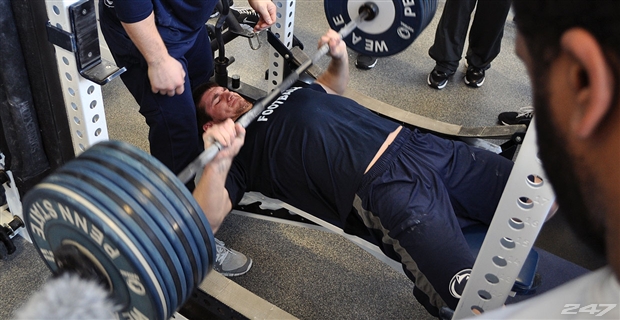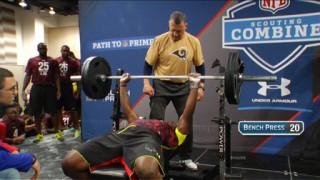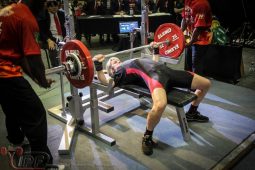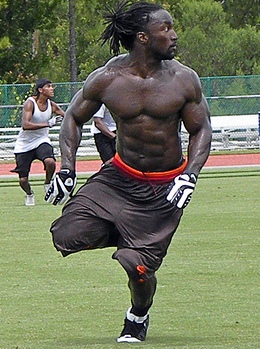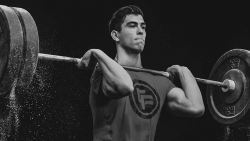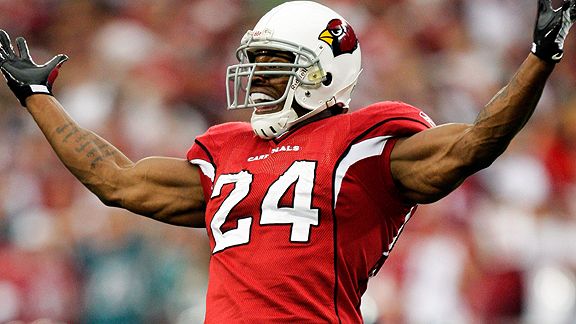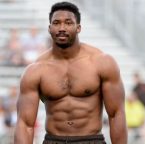Penn State University Football is a strong program that is rich with tradition. When you get to this level the football is as important as class and, let’s be honest, more important than class for some athletes. Many of them have dreams of playing in the NFL on Sundays, but you can’t get there without putting in the work.
The video below shows a team bench press workout and they really get after it. Enjoy
Related: Best Flat and Adjustable Benches on the Market
!
Related: Become A Football Beast With The Football Performance System
The bench press is often considered a cornerstone exercise for football players and it’s not just because of tradition; it has real, practical benefits that translate to performance on the field.
Strength Development:
The bench press is primarily a strength-building exercise that targets the chest, shoulders, and triceps. In football, upper body strength is crucial for linemen who need to push opponents away, for receivers who have to fend off defenders, and for any position that involves tackling or blocking. The bench press develops the kind of ‘pushing’ strength that is directly applicable to these actions.
Power Output:
The bench press isn’t just about slow, grinding reps. Variations like the explosive bench press or using bands can train the kind of quick, explosive power that football players often need, whether it’s for pushing off the line or throwing a powerful stiff-arm.
Muscle Endurance:
Football isn’t just a game of short bursts; it’s also a game that requires muscle endurance, especially in high-pressure, drawn-out situations like the fourth quarter. Higher rep bench press sets can help build this kind of endurance, ensuring that players are as strong in the final minutes as they are in the opening ones.
Balance and Stability:
Though it’s a straightforward movement, the bench press requires a fair amount of balance and stability in the shoulders and core. This helps football players improve their bodily control, which can be crucial during plays that require agility and dynamic movement.
Mental Toughness:
Let’s not overlook the mental aspect. The bench press is as much about mental grit as it is about physical strength, especially when you’re aiming for that new one-rep max. This mental toughness can translate well to the football field where resolve and resilience are often the keys to success.
Combine Testing:
In the world of football, the bench press is also one of the exercises used to assess athletes in the NFL Combine. The players are tested for the number of reps they can complete at 225 pounds, making it a crucial metric for their overall evaluation.
Injury Prevention:
A well-executed bench press program, especially one that includes variations like the close-grip bench for tricep strength or dumbbell bench press for better shoulder stability, can help in injury prevention. Stronger muscles and better balance mean a lower risk of muscle strains or tears.
Functional Training:
While isolation exercises have their place, the compound nature of the bench press trains multiple muscle groups in a manner that’s functional and applicable to the kinds of complex, coordinated movements football players need to make.
Given its multitude of benefits, it’s easy to see why the bench press is considered so important in football training regimes. However, it’s essential to integrate it into a more comprehensive strength and conditioning program for the best results.
Keys To A Better Bench Press
So you want to up your bench press game, huh? I get it; it’s the classic measure of strength in the gym. But before you start stacking on more plates, let’s get a few things straight to make sure you’re doing it safely and effectively.
Technique, Technique, Technique:
First off, your form has got to be on point. You want your feet firmly planted, a slight arch in your lower back, and your shoulder blades retracted. When you grip the bar, aim for something that feels natural but still allows you to engage your chest, shoulders, and triceps. And please, for the love of all things gym-related, don’t bounce the bar off your chest.
Warm Up Properly:
Warming up isn’t just doing a few stretches. You want to start with lighter weights and work your way up to your working sets. This not only preps your muscles but also helps you practice your form before the heavy lifting starts.
Mind-Muscle Connection:
This might sound a bit out there, but you’ve got to focus on the muscles you’re trying to engage. If you’re just moving the bar up and down without thinking about it, you’re missing out. Try to really feel your chest, shoulders, and triceps doing the work.
Mix Up Your Training:
Don’t get stuck in a rut. If you’re always doing the same sets and reps, your body will adapt and you’ll hit a plateau. Add some variety by changing your rep ranges or throwing in some variations like close-grip bench press, incline bench, or even using dumbbells.
Nutrition and Recovery:
All the hard work you put in at the gym won’t mean much if you’re not taking care of yourself outside of it. Make sure you’re eating enough protein and giving your body time to recover. Maybe throw in some extra tricep work or shoulder stability exercises to help improve your bench indirectly.
Consistency Is Key:
Last but not least, you’ve got to be consistent. Strength doesn’t build overnight. Keep at it, and don’t get discouraged if progress feels slow. Everybody’s been there, and the only way out is through.

